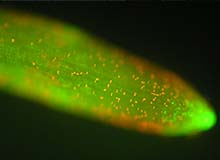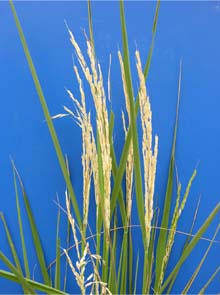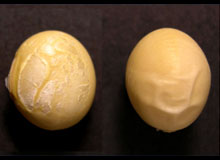Crop Science
Crop Science
Improvements of yield and resistance to abiotic stresses in crop plants
Staff
 | Prof. Dr. HIRAI Yoshihiko E-mail:yhirai (please add @okayama-u.ac.jp) Specialty: Crop science Improvement of crop yield and quality under various environments |
 | Asst.Prof. Dr. TOMITA Asami E-mail:asamitomita (please add @okayama-u.ac.jp) |
Research Topics
Environmental destruction is progressing now at an unprecedented scale, in the form of global warming and accompanying desertification, salt accumulation in soil, depletion of water resources, and so on. On the other hand, the human population continues to increase, and there is strong demand for expansion of food production. Therefore, in addition to improving the grain yield in arable land suitable for cultivation, production of agricultural crops is necessary even in inadequate lands affected by water shortage, salt accumulation etc. In this field we conduct physiological and ecological research and education concerning various crops for the purpose of improving crop production under defective environmental conditions and improving product quality.
Physiological study on improving salt tolerance of crops
|
For rice, wheat and barley, we are proceeding with elucidation of physiological and morphological traits which improve productivity under salt stress conditions, from various viewpoints, such as mechanisms related to the suppression of Na + and Cl - absorption, and mechanisms related to the maintenance of photosynthetic capacity. |  |
Genetic analysis of salt tolerance in rice
|
Although it is thought that various genes and physiological mechanisms are involved in salt tolerance, many unclear points remain, and breeding of salt tolerant varieties has not advanced much. For this purpose, we aim to identify genes affecting salt tolerance involved in the yield traits of rice, and are conducting analysis using chromosome segment substitution lines derived from salt sensitive and tolerant varieties. |  |
Study on Improvement of Appearance Quality of Soybeans
|
Seed coat cracking deteriorates the appearance quality and reduces the commercial value of soybeans. For this reason, we are conducting research aiming at elucidating the crack initiation mechanism and establishing cultivation methods to suppress the occurrence of cracks. We have clarified that the effects of environmental condition on cracking are different in different types of cracked seeds. We studies physiologically and morphologically to elucidate the relating factors for each type of cracked seeds. |  |
Publications
・Haburi, Tsuda, M. and Hirai, Y.: Water use and growth of rice (Oryza sativa L.) cultivated on saline soils with various amount of soil and water. Japanese Journal of Crop Science 83, 32-38 (2014).
・Tsuda, M., Ueda, Y. and Hirai, Y.: The effect of prevention of root injury on growth, development and dry weight in rice (Oryza sativa L.) transplanted to saline soil. The Scientific Reports of The Faculty of Agriculture, Okayama University 101, 7-12 (2012).
Haburi, Tsuda, M. and Hirai, Y.: Water use in wheat and barley grown on saline soils. Japanese Journal of Crop Science, 81, 64-70 (2012).
・Sone, C., Tsuda M. and Hirai, Y.: Effects of salinity on sodium accumulation in interspecific hybrid rice (NERICA) lines grown on different types of soil. Japanese Journal of Crop Science 80, 333-340 (2011).
・Hirai, Y., Tsushima, H. and Tsuda, M.; Effects of fertilization at flowering stage and environmental condition during seed-filling stage on soybean seed coat cracking of different types. Japanese Journal of Crop Science 80, 183-189 (2011).
・Tsuda, M., Endo, M. and Hirai, Y.: Effects of top dressing on growth and panicle dry weight as affected by soil water stress at early panicle-development stage in rice (Oryza sativa L.). Plant Production Science 13, 37-44 (2010).
・Sone, C., Tsuda, M. and Hirai, Y.: The salinity tolerance in an interspecific progeny NERICA 1 derived from the cross between O. sativa L. and O. glaberrima Steud. Japanese Journal of Crop Science 79, 184-191 (2010).
・Tsuda, M., Yokomizo, Y. and Takami, S.: Saline irrigation using ion-exchange resin and reverse osmosis membrane in wheat and barley. The Scientific Reports of The Faculty of Agriculture, Okayama University 99, 36-70 (2010).
・Hirai, Y., Numa, K., Nakai, K. and Tsuda, M.: Varietal difference in the cost of dark respiration for panicle growth and carbohydrate mobilization. Japanese Journal of Crop Science 79, 53-61 (2010).
・Wang, J., Tsuda, M. and Hirai, Y.: Increase in the water stress sensitivity at early panicle-development stage in rice under saline soil conditions. Japanese Journal of Crop Science 76, 540-547 (2007).